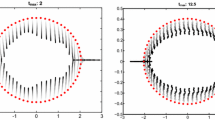Abstract
We are dealing with the validity of a large deviation principle for a class of reaction–diffusion equations with polynomial non-linearity, perturbed by a Gaussian random forcing. We are here interested in the regime where both the strength of the noise and its correlation are vanishing, on a length scale \(\epsilon \) and \(\delta (\epsilon )\), respectively, with \(0<\epsilon ,\delta (\epsilon )\ll 1\). We prove that, under the assumption that \(\epsilon \) and \(\delta (\epsilon )\) satisfy a suitable scaling limit, a large deviation principle holds in the space of continuous trajectories with values both in the space of square-integrable functions and in Sobolev spaces of negative exponent. Our result is valid, without any restriction on the degree of the polynomial nor on the space dimension.
Similar content being viewed by others
References
Bertini, L., Buttà, P., Pisante, A.: Stochastic Allen-Cahn approximation of the mean curvature flow: large deviations upper bound. Arch. Ration. Mech. Anal. 224, 659–707 (2017)
Budhiraja, A., Dupuis, P., Maroulas, V.: Large deviations for infinite dimensional stochastic dynamical systems. Ann. Probab. 36, 1390–1420 (2008)
Cerrai, S.: Second Order PDE’s in Finite and Infinite Dimension, Lecture Notes in Mathematics Series, vol. 1762. Springer, Berlin (2001)
Cerrai, S., Debussche, A.: Large deviations for the two-dimensional stochastic Navier–Stokes equation with vanishing noise correlation. arXiv:1603.02527
Cerrai, S., Freidlin, M.: Approximation of quasi-potentials and exit problems for multidimensional RDE’s with noise. Trans. AMS 363, 3853–3892 (2011)
Da Prato, G., Debussche, A.: Strong solutions to the stochastic quantization equations. Ann. Probab. 31, 1900–1916 (2013)
Da Prato, G., Zabczyk, J.: Stochastic Equations in Infinite Dimensions. Cambridge University Press, Cambridge (1992)
Da Prato, G., Zabczyk, J.: Ergodicity for Infinite-Dimensional Systems. London Mathematical Society Lecture Note Series, vol. 229. Cambridge University Press, Cambridge (1996)
Davies, E.B.: Heat Kernels and Spectral Theory. Cambridge University Press, Cambridge (1989)
Grieser, D.: Uniform bounds for eigenfunctions of the Laplacian on manifolds with boundary. Commun. Partial Differ. Equ. 27, 1283–1299 (2002)
Hairer, M.: A theory of regularity structures. Invent. Math. 198, 269–504 (2014)
Hairer, M., Weber, H.: Large deviations for white-noise driven, nonlinear stochastic PDEs in two and three dimensions. Ann. Fac. Sci. Toulouse Math. 24, 55–92 (2015)
Jona-Lasinio, G., Mitter, P.K.: On the stochastic quantization of field theory. Commun. Math. Phys. 101, 409–436 (1985)
Jona-Lasinio, G., Mitter, P.K.: Large deviations estimates in the stochastic quantization of \(\Phi ^4_2\). Commun. Math. Phys. 130, 111–121 (1990)
Mourrat, J.C., Weber, H.: Global well-posedness of the dynamic \(\Phi ^4\) model in the plane. Ann. Probab. 45, 2398–2476 (2017)
Mourrat, J.C., Weber, H.: Global well-posedness of the dynamic \(\Phi ^4_3\) model on the torus. arXiv:1601.01234
Ren, J., Zhang, X.: Freidlin–Wentzells large deviations for stochastic evolution equations. J. Funct. Anal. 254, 3148–3172 (2008)
Acknowledgements
Sandra Cerrai—Partially supported by the NSF grant DMS 1407615. Arnaud Debussche—Partially supported by the French government thanks to the ANR program Stosymap and the “Investissements d’Avenir” program ANR-11-LABX-0020-01.
Author information
Authors and Affiliations
Corresponding author
Appendix A
Appendix A
For every \(\delta >0\) and \(\theta \in \,(0,1)\), we denote
In case \(\theta =0\), we denote \(z_{\delta ,0}(t)=z_\delta (t)\).
Lemma A.1
Under Hypotheses 1 and 2, there exists \(\bar{\theta } \in \,(0,1)\) such that for any \(\kappa , p\ge 1\) and \(T>0\) and for any \(\delta \in \,(0,1)\) and \(\theta \in \,[0,\bar{\theta })\) we have
where
Proof
According to (2.3), for every \(p\ge 2\) we have
Hence, thanks to (2.2) and (3.2), we obtain,
Notice that, due to (3.3), there exists \(\bar{\theta } \in \,(0,1)\) such that the series above is convergent, for every fixed \(\delta >0\) and \(\theta \in \,[0,\bar{\theta })\).
We have
and then, with a change of variable, we obtain
Therefore, if \(\alpha =\theta =0\) and \(d=2\), since \(\beta >0\) we have
Otherwise, according to Hypothesis 2, there exists \(\bar{\theta }>0\) such that
for every \(\theta \in \,[0,\bar{\theta })\). Hence, as \(d-2(1-\theta )+\alpha >0\), we get
This implies (A.2), in case \(\kappa =p\). The general case follows from the Hölder inequality. \(\square \)
Next, for every \(s>0\), we have
Therefore, by proceeding as in the proof of Lemma A.1 we conclude
Lemma A.2
Under Hypotheses 1 and 2, there exists \(\bar{\theta } \in \,(0,1)\) such that for any \(s, T>0\) and for any \(\delta \in \,(0,1)\) and \(\theta \in \,[0,\bar{\theta })\) we have
where
Now, let us consider the linear problem
Its unique mild solution \(z_\delta (t)\) coincides with the process \(z_{\delta ,0}(t)\) defined in (A.1), for \(\theta =0\). Notice that, due to (A.2), we have
By using a stochastic factorization argument, for every \(\theta \in \,(0,1)\), we have
If we take \(\kappa >2/\theta \), we have
Therefore, if we fix \(\gamma >d-2+\alpha \) and we pick \( \theta _\gamma \in \,(0,\bar{\theta })\) such that
thanks to (A.2), we get
Thus, we have proven the following result.
Lemma A.3
Under Hypotheses 1 and 2, for every \(\kappa \ge 2\) and \(\delta >0\) we have that for every
it holds
Finally, by using again a factorization argument, for every \(s>0\) and \(\kappa >\frac{2}{s}\vee 1\) we have
Therefore, due to (A.4) we can conclude that the following result is true.
Lemma A.4
Under Hypotheses 1 and 2, for every \(s>0\), \(\delta \in \,(0,1)\) and \(\kappa \ge 1\)we have that
Rights and permissions
About this article
Cite this article
Cerrai, S., Debussche, A. Large Deviations for the Dynamic \(\Phi ^{2n}_d\) Model. Appl Math Optim 80, 81–102 (2019). https://doi.org/10.1007/s00245-017-9459-4
Published:
Issue Date:
DOI: https://doi.org/10.1007/s00245-017-9459-4



